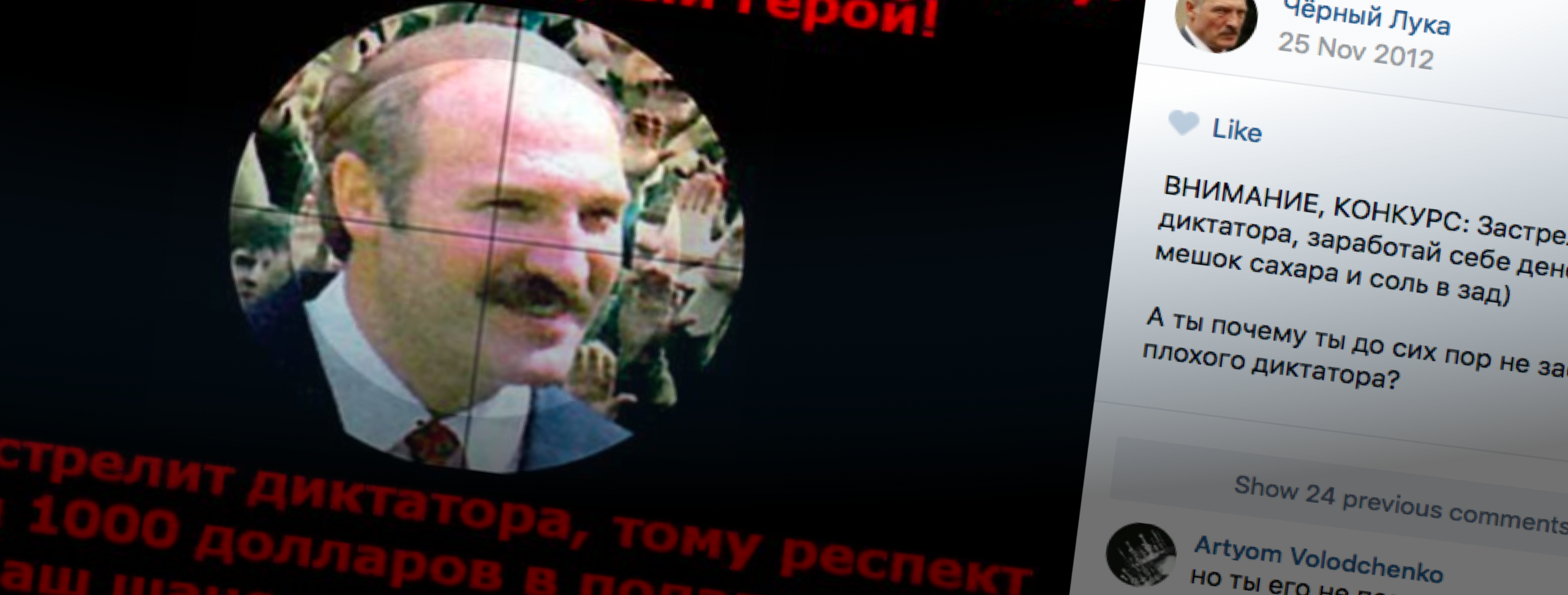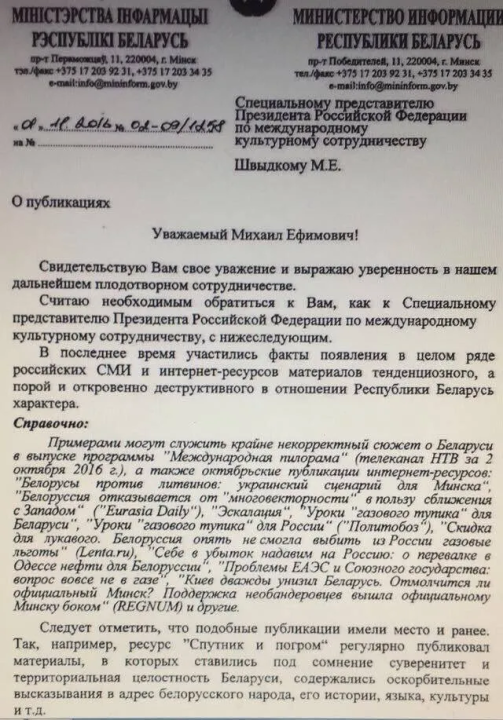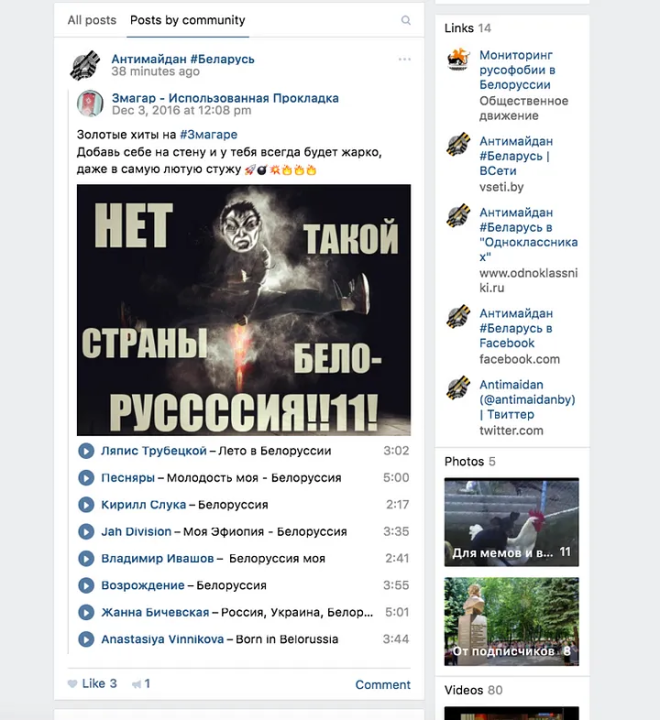Slavic Brotherhood?
What open sources can tell us about the arrest of three pro-Russian journalists in Belarus and the uneasy relationship between Minsk and Moscow.
Slavic Brotherhood?
Share this story

BANNER: Source: Black Onion / VK.com. Competition to shoot Belarusian President Alexander Lukashenko, November 2012
Between December 6 and 9, the Belarusian authorities arrested three pro-Russian journalists on the charge of spreading hate speech. The journalists had accused the Belarusian media and authorities of Russophobia and pro-Western leanings and questioned Belarus’ statehood.
The incident has further strained an already tense relationship between Minsk and Moscow, at a time when the Kremlin’s intentions towards its strategically located neighbor are increasingly under the spotlight.
What can open sources tell us about the journalists, the outlets and the tensions?
The journalists and the outlet
The Investigative Committee of Belarus identified the three detainees as Dmitri Alimkin, Sergey Shiptenko and Yuri Pavlovets, and listed the pseudonyms under which they wrote. Yuri Pavlovets (Юрий Павловец), identified by independent newspaper Novaya Gazeta as a politics lecturer at Belarus State University, wrote under two pseudonyms — Nikolai Radov and Pavel Yurintsev. Dmitri Alimkin (Дмитрий Алимкин), identified as a school guard from Brest, wrote under the name of Alla Bron. Sergey Shiptenko (Сергей Шиптенко), a former employee of the Government Academy under the president of Belarus, wrote as Artur Grigoriev. Shiptenko was reportedly fired in 2010 for cooperation with the Regnum and Imperija media sites. Shiptenko was arrested a day after Pavlovets and Alimkin. Prior to his arrest, he had commented on the situation saying “They were missing the little green men” — a reference to the disguised Russian special forces which annexed Crimea in 2014.

As of December 20, none of the trio had been active on social media since the arrests.
The journalists were employed by Regnum — a Russian media company regarded as toeing the Kremlin’s line, which has a history of clashes with the authorities in some of Russia’s neighbors.
In 2011, Turkmenistan accused Regnum of “distorting or openly falsifying the interpretation of various aspects of cooperation between our country and other nations”, including Belarus. In 2012, Latvia declared Regnum founder Modest Kolerov and deputy editor Igor Pavlovsky personae non gratae for “covert activities … directed against the security interests of Latvia, including territorial integrity and economic security of the country.”
Some of the writers’ articles can still be viewed on Regnum’s website, and appear to confirm a strongly pro-Russian and anti-Belarusian stance.
Headline: “Ukraine’s neo-Banderites and the neo-Nazis of ‘Soviet Belarus’: twin brothers” [“Banderites” is a common Russian pejorative term for what the Kremlin portrays as Ukrainian Nazis]
Key quote: “And the Ministry of Information of the [Belarusian] Republic for some reason prefers to fight windmills in Russia and not giant neo-Nazi cockroaches in its own home.”
Headline: “Belarus is quietly leaving the Russian world, learning from the Ukrainian experience”
Key quote: “The Belarusian government is hoping to overcome the sentiments of its citizens, the vast majority of whom want to be reunited with their great motherland — Russia.”
Headline: “The Ministry of Defense of Belarus named a Polish thief and an American general ‘Belarusian heroes’”
Key quote: “Therefore [the list of Belarusian heroes] made at the Ministry of Defence looks like the work of a nationalist-minded student”
The general theme of the articles is a rise of nationalism in Belarus, the country’s attempt to leave the so-called “Russian world” and an impending Belarusian Maidan.
The editor
The articles in question were procured by Regnum’s editor-in-chief Yury Baranchik, a Belarus citizen currently residing in Moscow, and another outspoken critic of Belarus. StopFake.org quoted him in January as writing articles criticizing Belarus and its leadership, and arguing that Belarusians do not exist as a nation.
His social media presence confirms his pro-Kremlin views. On Russian social network VK.com, he has shared content from an anti-American VK group, “USA — sponsor of world terror”, as well as posts endorsing Stalin.

Translation: “A monument to a soldier-liberator in Berlin and a Russian special forces soldier in Syria — there is such a profession as saving the world.”

Translation: “However much they praise Gorbachev, the nation despises him. However much they say bad things about Stalin, the nation respects him.”
Baranchik’s Facebook profile also reveals his strong links to pro-Russian separatists in Ukraine and the Russian government. Among his friends are people claiming to work for Russia’s Ministry of Defense and the separatist, unrecognized Donetsk People’s Republic — including Colombian separatist fighter Alexis Castillo Idodeai, whose presence in Ukraine the DFRLab has already described.
Following the arrests of the three journalists, Baranchik wrote at least four articles in the course of the following five days criticizing the Belarusian regime. Three of them were published by Regnum (here, here and here), one on News-Front (here), which is a pro-separatist outlet in Ukraine.
The articles all reinforced the same narrative: Minsk is becoming aligned with the Russophobic, Pro-Western opposition: “Russia is a big machine. These guys will not be forgotten because it’s not about them. It’s about a dirty campaign against Russia, the Russian world, the Orthodox faith, the Russian Orthodox church and supporters of the Russian world in the Republic.” Baranchik argued that Belarus is becoming a Nazi state and is beginning to follow the Ukrainian path and will soon have a Maidan of its own: “It is scary how similar the parallels are between the development of the situation in Belarus since 2014 and what is happening in Ukraine.”
“Information provocation”
This story fits into the context of a recent pattern of hostile media comments and unfriendly social media interventions between the governments in Minsk and Moscow.
In early November, Belarusian Minister of Information Lilia Ananich wrote a letter to the Russian President’s special representative for intercultural cooperation, Mikhail Efrimovich Shvydkoi. The letter was leaked to the media after the arrests.

In the letter, the minister accused “a whole range of Russian media and internet resources” of publishing “materials of a tendentious, and at times openly destructive, character towards the Republic of Belarus”. The paragraph in italics cited a number of examples:
· A “wholly incorrect program” on Belarus broadcast by the NTV TV station on October 2, 2016;
· The publication in October of online articles including “Belarus is against the Litvinovs [a term for ethnic Lithuanians in Belarus]: the Ukrainian scenario for Minsk”, “Belarus is rejecting multilateralism to connect with the West” (Eurasia Daily), “Discount for [Belarusian President Alexander] Lukashenko. Belarus again failed to beat gas discounts out of Russia” (Lenta.ru), and “Kiev has twice humiliated Belarus. Will Minsk remain quiet? Minsk’s support for neo-Banderites has backfired” (Regnum).
Ananich also wrote that similar publications had appeared before, questioning “the sovereignty and territorial integrity of Belarus and containing language humiliating the Belarusian nation, its history, language, culture, etc.”
In an interview to Belta.by on December 9, she repeated the complaint almost word for word, again naming Regnum, Lenta.ru and Eurasia Daily in particular. She singled out Regnum as the “most active” source of the “tendentious, and at times openly destructive” articles, accurately quoting a passage from one article (archived here) as saying, “The Belarusian language has no chance. It’s of no us to anyone except a crazed non-state trying to break its neck on the Maidan, after its neighbor’s example”. The author was Alla Bron, aka Dmitri Alimkin.
In the interview, Ananich confirmed that she had written to Shvydkoi. She said she had received a response, and quoted him as saying, “The statements made by marginal journalists in no way reflect the position of the Russian leadership, which is consistently striving to deepen Russian-Belarusian cooperation in all areas.” She herself said that “Of course, [the journalists’ comments] are not the position of the Russian leadership”, and that the two countries “should resist destructive pressures together and not give in to information provocation.”
Russia’s reaction
But some Russian officials and public figures were evidently provoked. Georgii Fedorov, a member of the Civic Chamber of the Russian Federation (a grouping of Kremlin-approved NGOs), was quoted as saying that Russia should intervene seriously on the level of the state, adding that the arrests were “not only a violation of the principle of freedom of expression, but also an openly unfriendly step towards Russia. Unfortunately, in Belarus today nationalist sentiments are increasingly gaining strength and popularity, which, as in the situation with the Ukrainian events of the past two years, are likely to carry Russophobic character.”
Leonid Levin, the head of the Russian Duma’s Committee on Information Policy — and secretary of the Russian journalists’ union — called the arrests a “worrying fact” and said that such arrests should be conducted only on serious grounds, “to avoid the suspicion of infringing freedom of speech”.
Duma member Vladislav Saharchuk added that Lukashenko was creating problems for himself and making a “Belarusian Maidan” come faster, and called modern Belarus a “pretty artificial territorial entity.”
Several Russian public figures demanded the immediate release of the jailed journalists, among them Mikhail Fedorchenko and Sergey Kondakov. The pair also urged the Russian media and Ministry of Foreign Affairs to join their demands.
The agency most implicated in the scandal — Regnum — released a statement saying: “Regnum believes the three authors detained are political prisoners, punished for taking a principled stand against the cooperation between the Belarusian government and the chauvinistic, Russophobic and neo-Nazi Belarusian opposition… The editors are convinced that the actions of the Belarusian security services are a provocation and betrayal towards Belarus and Russia, inspired by the goal of pushing Belarusian President Alexander Lukashenko the way of Ukraine’s ex-president Viktor Yanukovych”, who fled Ukraine at the climax of the Maidan movement in February 2014.
A tense context
The spat over the journalists comes against a backdrop of tensions between Minsk and Moscow. Relations between Belarus and its giant neighbor have always been complex, with Lukashenko periodically shifting closer to the West or the East as the geopolitical balance has tilted. Recent events have given at least the appearance that the Belarusian leader is glancing West again:
1. Belarus refused to allow Russia to deploy Iskander-M missiles on its territory (May 2016)
4. Lukashenko’s position vis-à-vis the Russian annexation of Crimea has been at best lukewarm: he only recognized Crimea as a ‘de facto’ part of Russia in April 2016, two years after the annexation, and added that he neither approved of Russia’s actions nor endorsed the fall of Yanukovych.
5. Belarus has been trying to secure alternative oil supplies, including from Azerbaijan, in order to reduce its dependency on Russian energy (December 2016).
The spat also comes amidst concerns over Russia’s military intentions towards Belarus. In late November, reports emerged of an 83-fold increase in the planned volume of military cargoes coming from Russia to Belarus in 2017. This spooked Belarus watchers, with some going so far as to say it might either indicate a military take-over of Belarus or a full-scale invasion of Ukraine and/or the Baltics.
Russia and Belarus regularly hold joint exercises, and the scale of these has grown sharply in recent years. An annual tripartite exercise with Russian, Serbian and Belarusian troops, Slavic Brotherhood, is scheduled in Belarus in June; a bilateral exercise, Zapad 2017, is to be held in September. Other commentators therefore argued that the big increase is related to Zapad 2017.

The planned cargo volume is still 20 times more rail cargo than was transported during Zapad 2013, which also took place in Belarus. However, that exercise involved a reported 10,000 troops, while the recent Kavkaz 2016 exercise in southern Russia involved a reported 120,000. The rail planning figures at least suggest that Zapad 2017 will be significantly larger than its predecessors; if so, this would put it on a par with other, more recent exercises in other parts of Russia.
Belarus has also made a number of military agreements with NATO members over the past year, including the United States in October, and Latvia in December. However, on December 12, Belarus signed a defense agreement with Russia permitting each country to deploy its special forces on the other’s territory. The Western rapprochement appears more likely to be a balancing act than an attempt to escape Russia’s influence.
Pro-Russian anti-Lukashenko groups
One further striking factor is the large number of users of the social network vk.com participating in anti-Lukashenko groups from locations in Russia. A number exist, of which the most significant are listed here:
“We are against Lukashenko”
The group does not list its administrators, but out of 1030 followers, 109 stated their location as Russia. The group’s description runs, in part, “We want freedom, democracy! Not portraits of Luka in school offices! Despite the regime’s claims of ‘liberalization’, the rights of active citizens are still being violated in Belarus. Detentions, arrests, dismissals, and demands to take up political refuge abroad have become a daily reality.”
The group has started a discussion called “Who’s for a coup in the country?”; as of December 19 it had 59 responses, the latest being posted on November 22. Most were in favor of a coup, and several from people apparently in active military service.
Some comments in the discussion board came from very obviously fake profiles that may have been created to implicate the West. For example, Mikhail Vavilov wrote:

“Death to Lukashenko and his [obscenity] regime! Long live Belarus! The homeland will be free! Belarus — EU!”
Mikhail’s profile says he works on NATO’s Committee For The Fight Against Totalitarian Regimes, which does not exist. The account only has two friends and its profile picture is clearly photoshopped:

This is clearly a fake account, but whether it was created to smear NATO or the Belarusian opposition, or as a satire, is unclear.
Boldyrev’s groups
A VK.com user from Russia, Vladimir Boldyrev, manages two anti-Lukashenko groups. A contract which he published on his VK page confirms that he is based in Russia.
· One is called Black Onion, which is a word play on Lukashenko’s last name (“Luk” means onion in Russian and Belarusian). This group has 274 followers; its posts refer to Lukashenko as “the Dictator” and his economic policies as “Lukanomics”, and mock aspects of his rule. A post from November 2012 featured a poster saying, “Our mega-competition: Hunt down the angry dictator. Reveal yourself, hero! Whoever kills the dictator will get $1000, this is your chance to establish yourself in life.”
· Another is called “Belarusian oppositionist”. It only has 53 followers, and the great majority of recent posts are re-posts of content from the Black Onion account; this appears to be a defunct group used to amplify the previous one.
· Strikingly, Boldyrev also lists on his account a VK group called “For Lukashenko”; its subtitle is “We are against the pro-Western opposition”, and includes comments such as, “Gayropa, hands off Belarus!” The account is significantly pro-Russian and anti-Western.
Anti-Maidan Belarus
A final example is a group called “Anti-Maidan Belarus”, which is currently offline, but was archived in April, at a time when it had 2,558 followers. Of those, 818 appeared to be from Russia. The logo of the page featured a St. George’s ribbon, which has become a sign of pro-Russian separatists in Ukraine. A screenshot taken in December, shortly before it went offline, reveals that its last post was a share on December 3, with the caption, “There’s no such country as Belarus”:

The group also shared several reports from think-tanks arguing that Belarus as a country does not exist and together with Ukraine should come under control of Russia.
Conclusion
The arrest of the three journalists comes at a time of ongoing tensions between Minsk and Moscow over energy and military deployments. It fits in the context of Lukashenko’s permanent balancing act between Russia and the West. In that sense, it is noteworthy that Information Minister Ananich stressed the distance between the journalists’ positions and those of the Russian government. However, a definite current of anti-Belarus and anti-Lukashenko sentiment is apparent in online Russian media and online communities, and the disputes over energy pricing and transit have not been resolved. At the same time, Russia appears to be planning its largest military deployment to Belarus in recent history for the Slavic Brotherhood and Zapad 2017 exercises. It will be important to observe the trend in relations in the coming months, as those exercises come nearer.

